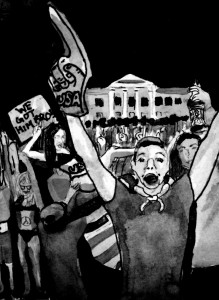Our 9/11 Narrative
For current college students, September 11th, 2001 was a beginning of sorts. It was a beginning of consciousness. It was a beginning of memory. Only in elementary school at the time, we can recall with great clarity where we were and what we were doing when the World Trade Center’s Twin Towers fell. Most of us were too young to truly remember life before 9/11. The nineties were just a fuzzy blur of Nickelodeon, Michael Jordan, and action figures. After the attack, 9/11 served as a defining moment that framed the lenses of our worldview.
Most of us consumed the day’s events from our families’ televisions. The attacks occurred as the twenty-four news cycle era was coming into its peak, or nadir, depending on how you look at it. We were saturated with both disturbing as well as moving images. For our formative minds, the scenes and rhetoric presented on television shaped the way we remember the attacks.
In the United States, 9/11 was predominantly presented in polarized terms. In speeches to the nation, President George W. Bush depicted Al-Qaeda not just as an aggressor but also as a bastion of “evil and destruction.” He portrayed the United States as the “brightest beacon of freedom and opportunity,” poised to liberate undemocratic countries across the world. In times of crisis, narratives such as this are attractive to people. After a terrible loss, it is cathartic. While the enemy had seemed distant and faceless, the narrative portrayed the enemy as imminent and tangible. But what makes the narrative so rhetorically compelling is also what makes it so dangerous. It is simple. It does not allow for much nuance

College students relished in this type of melodramatic narrative when we flocked to the movie theaters to see Harry Potter and the myriad of superhero movies that came to define the cultural decade. The movies are appealing to us because we know the heroes are unequivocally “good” and the villains are unequivocally “bad.” Beyond the triumph of “good” over “evil,” there is little in the movie that the viewer must navigate. Nothing is wrong with these stories. In fact, melodrama is often why we see movies in the first place. Problems emerge, however, when we inject melodrama into the world around us.
Melodramas, by their definition, ignore the laws of cause and effect. Since we were so young when it happened, we often fail to look at 9/11 in its broader context. Yes, the attacks were an act of aggression by Al-Qaeda, but weren’t they also a residual of fifty years of aggressive U.S. foreign policy? Yes, Al-Qaeda still poses a threat to innocent people around the world, but could the United States be contributing to the conditions that make their continued threat possible? Muhlenberg Professor James Peck’s essay “September 11th: A National Tragedy?” likens melodrama to the artificial contents of a Twinkie. “Melodrama is pleasing like a Twinkie is pleasing, but like a Twinkie, it’s a lie.”
The night President Barack Obama announced to the nation that Osama bin Laden had been assassinated, college students across the country gathered together to celebrate the death of their childhood villain with jingoistic jubilance. Our celebrations were broadcast around the world, becoming definitive images to a new wave of formative young minds
Reporters consistently likened the cheering crowds to a celebration after a major football victory. After a decade of observing the drama from the bleachers, it was our turn to storm the field. Our Voldemort had been vanquished.
If the world were a melodrama, the final buzzer would have sounded. The credits would be rolling across the screen. The world, however, does not work that way. Osama bin Laden’s death was no panacea. There are other problems we must confront. As we continue to involve ourselves in the affairs of other countries, will we continue to satiate our desire for the melodramatic? The narrative remains to be written.